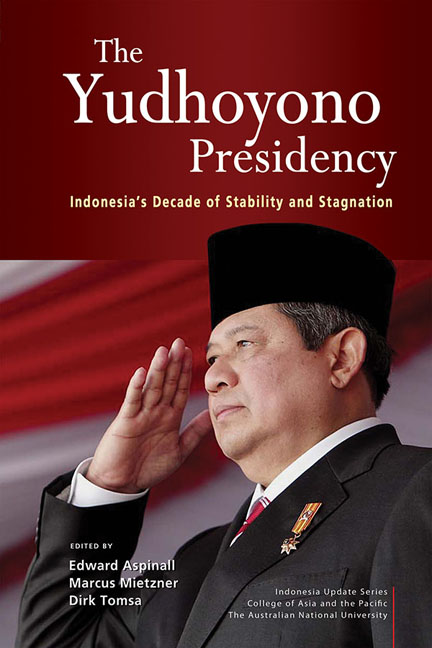Book contents
- Frontmatter
- Contents
- Tables and figures
- Contributors
- Acknowledgments
- Glossary
- 1 The moderating president: Yudhoyono's decade in power
- 2 Prologue Yudhoyono's legacy: an insider's view
- PART 1 PERSONAL, COMPARATIVE AND INTERNATIONAL PERSPECTIVES
- PART 2 INSTITUTIONS, POLITICS AND SECURITY
- PART 3 GENDER, HUMAN RIGHTS AND ENVIRONMENT
- 11 Yudhoyono's politics and the harmful implications for gender equality in Indonesia
- 12 Human rights and Yudhoyono's test of history
- 13 Religious politics and minority rights during the Yudhoyono presidency
- 14 Big commitments, small results: environmental governance and climate change mitigation under Yudhoyono
- PART 4 THE ECONOMY AND SOCIAL POLICIES
- Index
- Miscellaneous Endmatter
14 - Big commitments, small results: environmental governance and climate change mitigation under Yudhoyono
from PART 3 GENDER, HUMAN RIGHTS AND ENVIRONMENT
Published online by Cambridge University Press: 19 May 2017
- Frontmatter
- Contents
- Tables and figures
- Contributors
- Acknowledgments
- Glossary
- 1 The moderating president: Yudhoyono's decade in power
- 2 Prologue Yudhoyono's legacy: an insider's view
- PART 1 PERSONAL, COMPARATIVE AND INTERNATIONAL PERSPECTIVES
- PART 2 INSTITUTIONS, POLITICS AND SECURITY
- PART 3 GENDER, HUMAN RIGHTS AND ENVIRONMENT
- 11 Yudhoyono's politics and the harmful implications for gender equality in Indonesia
- 12 Human rights and Yudhoyono's test of history
- 13 Religious politics and minority rights during the Yudhoyono presidency
- 14 Big commitments, small results: environmental governance and climate change mitigation under Yudhoyono
- PART 4 THE ECONOMY AND SOCIAL POLICIES
- Index
- Miscellaneous Endmatter
Summary
Under the Yudhoyono presidency, the environment featured in Indonesia's national and international politics with a prominence it had never previously achieved. It was not just the slew of new policies and initiatives; President Yudhoyono himself seemed to take the issue more seriously than any previous Indonesian president. This was most dramatically demonstrated at the G20 conference in Pittsburgh in 2009 when he announced to the world that, by itself, Indonesia would reduce its carbon emissions below business-as-usual projections by 26 per cent by 2020, and by 41 per cent if the country received international support. With some 80 per cent of Indonesia's emissions the result of forestry and land-use change, in 2010 Yudhoyono issued a two-year moratorium on the issuing of new permits to develop primary forests and peatlands, a proscription that covered 74 million hectares of forest land and that was subsequently extended until 2015. At a conference in 2011 he promised to ‘dedicate the last three years of my term as President to deliver enduring results that will sustain and enhance the environment and forests of Indonesia’ (Lang 2011). In 2013 he established a national agency for reducing emissions from deforestation and forest degradation. For these and other reasons, Yudhoyono has sometimes been lauded at home and abroad for his environmental commitments and achievements. Upon stepping down as Indonesian president, he goes on to become the chair and president of the Global Green Growth Institute, an international organisation with a mission to promote environmentally sustainable economic development.
This chapter assesses Yudhoyono's environmental record by considering two major initiatives that took place during his time in office: the passage and implementation of a new environmental law, and the introduction of plans for climate change mitigation. The new Environment Law, the aim of which was to provide environmental protection and management for the benefit of all citizens, resulted from the efforts of a broad coalition in parliament, including Yudhoyono's party, and created big opportunities to improve environmental management. Addressing climate change was very much Yudhoyono's own issue, which he promoted at home and especially abroad. The president and his government were able to bring in new environmental and climate policies and link them to public participation and anti-corruption efforts.
- Type
- Chapter
- Information
- The Yudhoyono PresidencyIndonesia's Decade of Stability and Stagnation, pp. 258 - 278Publisher: ISEAS–Yusof Ishak InstitutePrint publication year: 2015

